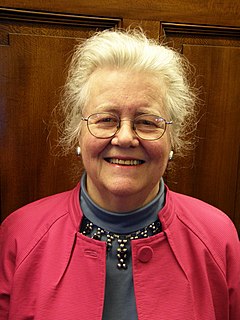A Quote by Jonathan Raban
One of the oddest features of western Christianized culture is its ready acceptance of the myth of the stable family and the happy marriage. We have been taught to accept the myth not as an heroic ideal, something good, brave, and nearly impossible to fulfil, but as the very fiber of normal life. Given most families and most marriages, the belief seems admirable but foolhardily.
Related Quotes
Here is a myth for you if myths are your pleasure: "There is no more opportunity in this world." Most people held this false belief fifty years ago, the majority agreed with it five years ago, and practically everyone clings to it today. Clearly, this myth will also be the screaming rage in the future. Hang on to this myth, and you are destined to miss great opportunities for the rest of your life.
But the myth of power is, of course, a very powerful myth, and probably most people in this world more or less believe in it. It is a myth, which, if everybody believes in it, becomes to that extent self-validating. But it is still epistemological lunacy and leads inevitably to various sorts of disaster.
Extended families have never been the norm in America; the highest figure for extended-family households ever recorded in Americanhistory is 20 percent. Contrary to the popular myth that industrialization destroyed "traditional" extended families, this high point occurred between 1850 and 1885, during the most intensive period of early industrialization. Many of these extended families, and most "producing" families of the time, depended on the labor of children; they were held together by dire necessity and sometimes by brute force.
The reason I wouldn't dare to write a Western is simply because that seems to be so much a part of American culture. Maybe if I want to write a Western enough I should try to overcome that fear, but I'll certainly feel like I'm trespassing. I feel that that is so much a part of American foundation myth, it's part of the myth of America, the American vision of what America is, which people have glorified and then challenged and then vilified.
It is my belief that we need a new transnational sustaining 'myth' that can impart value and respect. It is my further belief that we are coming to see our universe and life as creative, without a directing agency. Meaning emerges with life. If this view becomes widespread, it has the promise to become the sustaining myth we need to sustain in turn an emerging global civilization.
While some multimillionaires started in poverty, most did not. A study of the origins of 303 textile, railroad and steel executives of the 1870s showed that 90 percent came from middle- or upper-class families. The Horatio Alger stories of "rags to riches" were true for a few men, but mostly a myth, and a useful myth for control.
The problem is acceptance, which is something we're taught not to do. We're taught to improve uncomfortable situations, to change things, alleviate unpleasant feelings. But if you accept the reality that you have been given- that you are not in a productive creative period- you free yourself to begin filling up again.
But myth is something else than an explanation of the world, of history, and of destiny. Myth expresses in terms of the world - that is, of the other world or the second world - the understanding that man has of himself in relation to the foundation and the limit of his existence. Hence to demythologize is to interpret myth, that is, to relate the objective representations of the myth to the self-understanding which is both shown and concealed in it.
It seems to me that obliviousness about white advantage, like obliviousness about male advantage, is kept strongly inculturated in the United States so as to maintain the myth of meritocracy, the myth that democratic choice is equally available to all. Keeping most people unaware that freedom of confident action is there for just a small number of people props up those in power and serves to keep power in the hands of the same groups that have most of it already.
Myth was regarded as primary; it was concerned with what was thought to be timeless and constant in our existence. Myth looked back to the origins of life, to the foundations of culture, and to the deepest levels of the human mind. Myth was not concerned with practical matters, but with meaning. Unless we find some significance in our lives, we mortal men and women fall very easily into despair. The mythos of a society provided people with a context that made sense of their day-to-day lives; it directed their attention to the eternal and the universal.







































